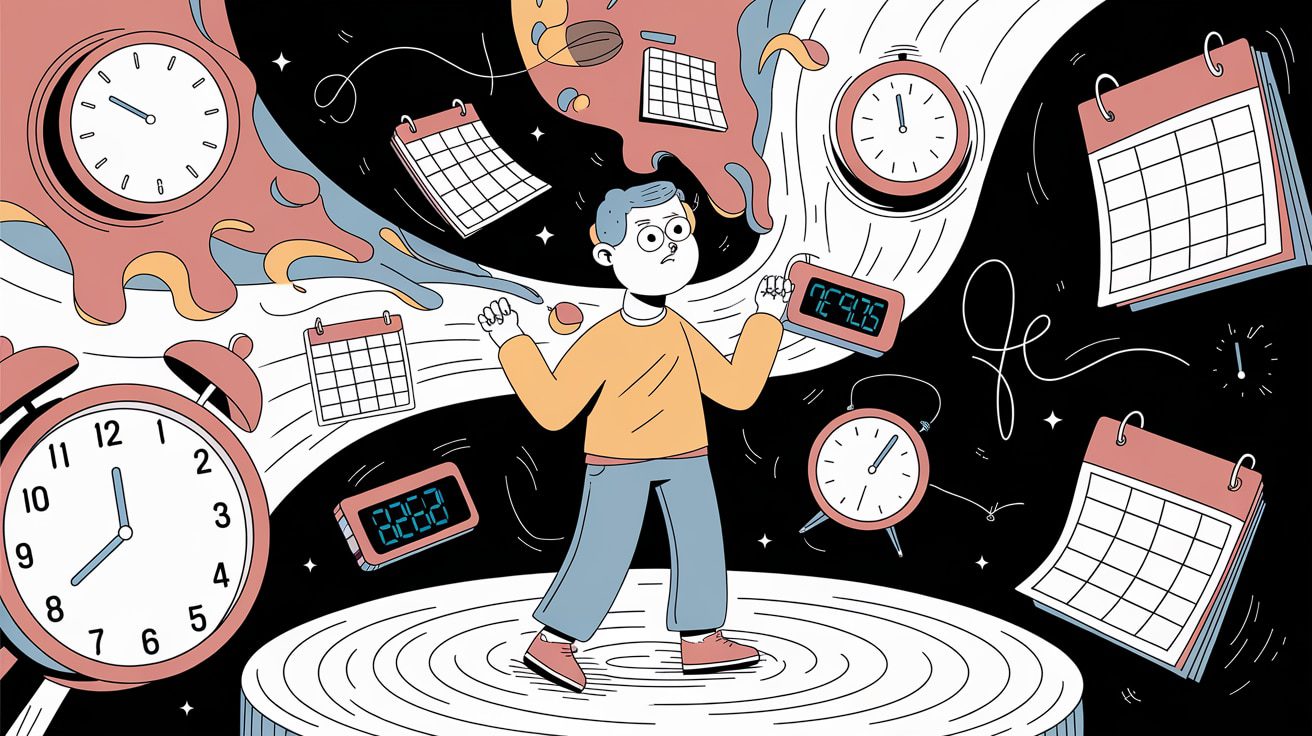The ADHD Survival Guide to Time Travel (Or Blindness)
If you have ADHD, you have probably had at least one moment where you blink, and suddenly it is three hours later, or you swear you set a timer five minutes ago, but it turns out it has been an hour. Time does not flow normally when you have ADHD. It bends, warps, and sometimes just straight-up disappears. This is time blindness, and it is not just about losing track of time. It is about having a completely different experience of time itself. Neurotypical people treat time like a well-organised filing cabinet. People with ADHD treat time like that one kitchen drawer stuffed with batteries, takeaway menus, and three pairs of scissors. It is all there… somewhere.
So, let’s talk about why ADHD brains struggle with time and how to hack time perception to avoid missing deadlines, being late for everything, and feeling like the present moment is either moving at lightspeed or frozen in molasses.
What is Time Blindness?
Time blindness is the inability to accurately perceive the passage of time. It is why people with ADHD:
Unlock peak brain performance with science-backed biohacks. Join free now & get your guide for just £4.99 (45% off)!

- Think they have plenty of time to get ready, then suddenly realise they should have left twenty minutes ago.
- Sit down to check one email and somehow emerge four hours later.
- Start a task with the best intentions but get distracted and assume only a few minutes have passed when in reality, the sun has set, and they have no idea what year it is.
Time blindness is not just about being forgetful. It is a neurological difference in how the ADHD brain processes time. There are only two real-time states: Now and Not Now. The future is an abstract concept that feels distant until, suddenly, it is happening, and panic sets in.
The ADHD Brain and Time Perception
But hold on a second. Who decided time was linear in the first place? Science loves its clocks and schedules, but plenty of cultures and philosophies argue that time is actually cyclical. Think about it; seasons, moon phases, the way your laundry pile mysteriously regenerates itself no matter how often you do it. Maybe ADHD brains aren’t broken. Maybe we’re just tuned into a different kind of time. Who’s to say neurotypicals got it right?
So why does time feel like such a cruel joke when you have ADHD? It comes down to dopamine and executive function. The prefrontal cortex, the part of the brain responsible for planning, prioritising, and time awareness, does not work in the same way for people with ADHD. Dopamine levels influence motivation and focus, which means anything interesting or rewarding feels like it happens instantly, and anything boring or tedious stretches into eternity.
A neurotypical brain might think: I have a deadline in three days, I should start now so I do not have to rush later.
An ADHD brain thinks: Deadline? Oh, that is future me’s problem. Then three days pass in what feels like a blink, and suddenly future you is crying into a laptop at 2 AM.
How Time Blindness Affects Everyday Life
One major trap is getting fixated on the wrong time. If your appointment is at 4 PM, do not lock 4 PM into your brain. That is when you need to be there, not when you start getting ready. If you need 30 minutes to get ready and 30 minutes to travel, your actual ‘start moving’ time is 3 PM. But ADHD brains love to register the final deadline, not the steps leading up to it. This is why we suddenly panic at 3:55 PM, standing in a towel, wondering how time just disappeared.
- Work and Deadlines: Always underestimating how long a task will take, leading to missed deadlines or frantic last-minute scrambles.
- Appointments and Punctuality: Knowing exactly what time you need to leave but still somehow running late.
- Relationships: Friends and family might see it as thoughtlessness when you genuinely lose track of time and forget to respond to messages or show up on time.
- Money Management: Paying bills on time is hard when due dates feel like a vague suggestion rather than an actual deadline.
- Self-Care: The classic “I will go to bed in five minutes” lie that results in scrolling TikTok at 3 AM.
How to Hack ADHD Time Blindness
The good news is, while you cannot cure time blindness, you can work around it with the right strategies. Here is how:
1. Externalise Time
Since ADHD brains struggle with internal time awareness, make time visible and external.
- Use visual timers instead of relying on internal clocks.
- Set alarms for everything, including reminders to check reminders.
- Use analogue clocks instead of digital ones, so you can see time moving.
- Create time anchors by pairing routines with existing habits. Example: Always taking medication with breakfast.
2. Time Chunking
- Break tasks into small, specific blocks rather than one big overwhelming task.
- Use Pomodoro techniques (work for 25 minutes, then take a short break).
- Set a timer for transitions, like “I will leave in ten minutes” with an actual alarm, because just knowing will not work.
3. Use “Body Doubling”
- Having someone else around while you work helps keep track of time. This can be a coworker, a friend, or even a virtual body double through an online community.
4. Make Time Feel Urgent… But Not Stressful
- Set false deadlines ahead of real deadlines to trick your brain into urgency.
- Gamify time by racing the clock (example: “Can I finish this task before my timer runs out?”).
- Use countdown apps that show time visually shrinking.
5. Automate Everything Possible
- Set up automatic bill payments and recurring reminders for important dates.
- Use habit stacking so one routine naturally triggers another. Example: “I brush my teeth, then I take my meds.”
The Final Word on ADHD and Time
Time blindness is real, and it is frustrating. But you are not lazy, careless, or irresponsible. Your brain simply does not experience time the same way as neurotypical people. Instead of fighting against it, the key is to work with how your brain actually functions and use external systems to keep time in check.
Because let’s be real… until science invents actual time travel, we are all just doing our best not to get stuck in another accidental three-hour YouTube rabbit hole.
Join Our Community
If this sounds familiar, you are not alone. Join our community where we share ADHD-friendly strategies, real-life experiences, and a judgment-free space to figure out how to make time work for us; instead of against us.
Disclaimer: This post is for informational purposes only and does not constitute medical advice. Some links may be affiliate links, which help support this site at no extra cost to you.







